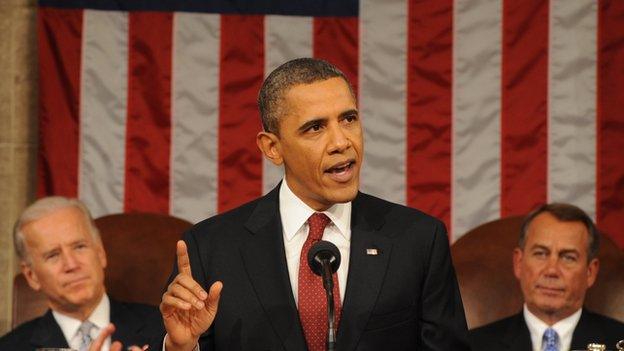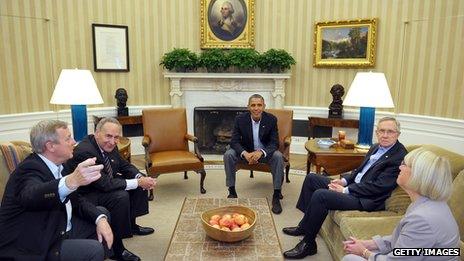State of the Union: Time's running out
- Published
- comments

In 2013, Obama pushed for reforms that never came on guns, immigration and climate change
As Barack Obama prepares to give his annual address to the US , the BBC's Katty Kay looks at obstacles in the way of his agenda
Washington can be a cold, cruel city, as anyone who is living here this freezing January is well aware. And as he heads into his sixth State of the Union address, no-one is feeling the chill more than Barack Obama.
The president has three years left in the White House, but already everyone here is focused on who replaces him in 2016 and who will win the midterm elections in 2014. With time moving on, chances are slim that he can get anything major done in what remains of his presidency.
In last year's address to the nation, Obama promised action on three important issues: immigration, guns and the environment. As of today, there has been no legislation on any of those. A gridlocked Congress has thwarted his every attempt to pass laws that would make it possible for undocumented immigrants to stay here legally or increase background checks on gun sales or expand environmental controls.
It is a far cry from the heady days of 2009 when a young, charismatic Barack Obama arrived in the Oval Office under a crush of outsized expectations. Back then his every word was gospel. It seems an age ago. Now, the question ahead of this year's State of the Union is, does anyone even listen anymore?
The president craves momentum. Instead he seems stuck.
And much though the White House might like to, it can't blame the Republican party for all Obama's woes. After all, in the end, it was a handful of Democratic senators who blocked gun control laws. Why couldn't President Obama call those members of his own party and force them to vote with him?
The answer to that gets to the root of this president's diminished room for action.
He hasn't wooed Congress - Republicans or Democrats - and so he doesn't have much personal capital in the capital. Persuading people to do things that go against their interests is a lot harder when you haven't invested energy in getting them on your side.

Obama met with Senate Democrats in the Oval Office in 2013, but his failure to do enough outreach to his Congressional allies and opponents limits his ability to enact his agenda
The insiders around town - the staffers who used to work in the White House and the journalists and analysts who report on it - all say the same thing. Barack Obama has relationship problems, at home and abroad.
Just as the presidency seems to be stagnating domestically, America appears to be retreating internationally. Obama's credibility in Europe has been diminished because of the revelations of National Security Agency surveillance of foreign leaders. There are concerns in the Middle East that this White House is intent on withdrawing from the region as fast as possible. (The administration, by the way, ferociously denies that this is the case and points to diplomatic efforts in Iran, Syria and the Middle East peace process as evidence, but that hardly matters. The perception among Arab allies is already damaging.) And Asians wonder whether the world's superpower is becoming the world's shrinking power.
Again, relationships may be part of the problem. One Middle-East expert this week who'd just returned from Riyadh told me the Saudis feel neglected because the president just hasn't done enough to consult with them on policy.
Add to this aversion to schmoozing, the mishandled decision on whether or not to strike Syria and the disastrous role of his health care reform website and you have to conclude that Obama heads into the 2014 State of the Union in a weaker position than he was a year ago.
His saving grace is that Republicans are in an even weaker position than he is. The party's approval ratings are lower than the president's. They are failing to reach out to women, young people, Hispanics and African Americans - all important voting groups. And on the signature issue of income inequality - something Obama intends to spend a lot of time on this year - Republicans are struggling to come up with any ideas that don't smack of "let's just cut taxes."
This buys the president a little bit of time. He can still use that to get things done over the next six months, which is really all he has before mid-term fever makes legislative action totally impossible.
The smart money in Washington thinks two things could get done this year. First, we could see some form of immigration reform: not a big comprehensive bill, but something smaller. And, Mr Obama may be able to use his Presidential powers to bypass Congress and get something done to raise the minimum wage. That could help narrow the gap between rich and poor.
It is a far cry from the lofty, change-the-world approach of the first term. But six years have beaten the idealism out of Barack Obama. The man who goes to address Congress on Tuesday is more pragmatic. Forget changing the way government works here.
In this environment, just keeping it open counts as success.